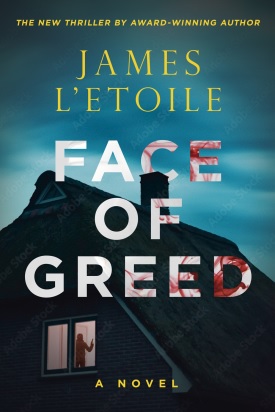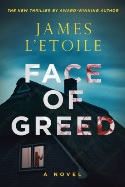 Synopsis:
Synopsis:
Greed, corruption, and betrayal . . . No murder is as simple as it seems.
When a prominent Sacramento businessman is killed and his wife injured in a brutal home invasion, Detective Emily Hunter and her partner, Javier Medina, are called to the scene. At first, it appears that crimes of opportunity went horribly wrong. But Emily soon realizes there’s more to the crime — and the dead man — than it first appeared. Her investigation uncovers a web of secrets, deceit, and corruption. While the city’s political elite want the case solved quickly, dark forces want it buried.
Torn between the high-stakes investigation and caring for her mother, who is afflicted with early onset Alzheimer’s disease, Emily struggles to find balance.
Could there have been a motive behind the attack, making it more than a random home invasion? Emily uncovers clues that cause her to reconsider her understanding of the crime. She discovers the dead man blackmailed a federal prosecutor to turn over files pertaining to an investigation into organized crime. When the files disappear, a grieving widow and a prison gang vie for control of the dead man’s secrets.
A deadly game of greed and deception pulls Emily deeper into the shadowy world of gang violence and retribution as she walks the razor’s edge to identify the killer . . . without becoming his/her next victim.
Review:

Author James L’Etoile began his long tenure in corrections as a probation officer in a juvenile facility. He subsequently became a correctional counselor and was promoted to the position of associate warden of a maximum-security prison. His career culminated with a stint as the director of the Division of Adult Parole Operations with the California Department of Corrections and Rehabilitation.
His duties included drafting release reports for judges. One day, after retiring, it occurred to him that he wrote crime stories throughout his career. Drawing on his experience and knowledge, he decided to pursue a new career writing fiction. Black Label, his first published novel is a stand-alone psychological thriller dealing with big pharma and featuring a female protagonist. He next launched his Detective Nathan Parker series with Dead Drop, set in the Southwest and dealing with the immigration crisis and those caught in the middle of it. Devil Within is the second installment in the series.
Face of Greed is the first offering in a new series. Inspiration for the story came from one of the first murder investigations in which L’Etoile participated. Three Aryan Brotherhood members broke into a home and forced the homeowner to open a safe before executing him. The perpetrators claimed the homeowner “was a drug dealer and was rumored to keep large quantities of product and cash in his safe” and “stiffed them in a drug deal,” L’Etoile recalls. “The murder was somehow justified as self-defense in their minds.” But the jury rejected their proffered defense. The shooter was sentenced to death and the other two criminals received long prison sentences. L’Etoile says that case “always stuck with me” and prompted him to pen a story in which he asks “what if there was something more sinister going on in that house than we were led to believe?”
Face of Greed introduces readers to Emily Hunter. She has been a Detective with the Sacramento Police Department for five years. When asked why he opted to craft the series around another female protagonist, L’Etoile reveals that it puts him “on edge” and prevents him from making assumptions, permitting him to “get into [the story] a little more.” Crafting a believable female law enforcement professional also makes him work harder. “You can’t just put the character in a dress,” he notes. L’Etoile, whose own daughter is in law enforcement in addition to being one of his beta readers, believes that women in what is still a male-dominated profession don’t yet receive the recognition they deserve. “They still have to work harder than men to be recognized” and are often expected, like their male peers, to conceal their feelings while performing duties that frequently invoke strong emotional reactions. L’Etoile acknowledges that law enforcement is evolving and more resources are being offered to employees to help them cope with job stressors.
Emily is single and committed to her job. She is also a loving daughter, devoted to ensuring that her seventy-year-old mother, Connie, is safe and well cared for. Connie, a retired teacher, is afflicted with early onset Alzheimer’s disease and no longer able to live independently so four months ago, Emily insisted that Connie move in with her. She has enlisted a caregiver, Sheila, to watch over Connie while she works, but her schedule is anything but predictable and she often works long hours, so the logistics have thus far proven challenging. Indeed, as the book opens, she arrives at home to find that Connie has wandered off again, prompting Sheila to suggest that Emily consider relocating Connie to a secure facility where she can receive a higher level of care. L’Etoile says Emily is “afraid to lose what’s left of her mother at the expense of holding down a detective’s job. She’s not one to ask for help . . .” But that night she has no time to debate the subject with Sheila because she is immediately called back to work by the Watch Commander. It’s a high-profile case in which the Chief of Police and Mayor are taking a personal interest and the unusual step of responding to the scene.
Emily and her partner of six months, Detective Javier Medina, arrive at a stylish home on 46th Street in the heart of one of Sacramento’s most prestigious neighborhoods, known as the “Fabulous Forties.” Roger Townsend, a fifty-year-old power player in California political circles, has been murdered in his home, “his throat slit from ear to ear.” His glamorous wife, Lori, interrupted what appears to have been a home invasion robbery and suffered minor injuries. The floor safe in Townsend’s home office is open but there is no evidence suggesting that it was forced open. Lori insists that only her husband knew the combination to the safe and he kept only a modest amount of cash and some papers in it. A small amount of light-colored powder is visible on the bottom of the now empty safe. Lori quickly retreats to the Townsend estate in Granite Bay, and the coroner’s examination soon reveals that Townsend was also shot in the back . . . and was terminally ill.
As Emily and Javier begin investigating, their efforts are thwarted by Lori’s close friendship with the Mayor. Their interview with the Managing Partner and In-House Counsel of Townsend and Associates leads to more questions about the nature of Townsend’s business dealings and holdings, as well as why a sleazy criminal attorney operating out of a J Street storefront was Townsend’s personal lawyer. They follow clues that will hopefully provide insight into the motivation for Townsend’s killing, but more crimes, including another murder, yield more suspects and complicate their efforts. The Chief is anxious to wrap up the investigation, claiming that the case has been solved and the killer taken into custody. Emily risks an insubordination charge as she seeks to avoid a confrontation with him and the Mayor because “[o]nce politics infects a case, common sense disappears.” But it becomes increasingly apparent that politics are impeding Emily and Javier’s efforts to unravel a mystery that grows increasingly complex and convoluted, involving another detective, ex-convicts who served time in Pelican Bay (one of California’s most dangerous and notorious prisons), members of the Aryan Brotherhood, and even an Assistant United States Attorney.
Emily is a compelling character. She is a competent and determined detective, savvy and respected by colleagues who are willing to aid her efforts with leads and tips. She is willing to take risks to uncover the truth, and skates dangerously close to derailing her career when she refuses to capitulate to the political machinations of her superiors and the interference of the Mayor in her investigation. “She’s fought to get to her position in a male-dominated profession and deals with the misogynistic fallout from officers who don’t think she deserved her promotion,” L’Etoile says. “Like many women in law enforcement I’ve known, she has to work harder to get the same opportunities as her male counterparts.” Her partnership with Javier is both collegial and affectionate, characterized by often hilarious and believable bickering and teasing. It is evident that Javier, the junior member of the team, is not threatened by Emily or in any way uncomfortable being subordinate to a female detective. On the contrary, they have a great deal in common, not the least of which is their love for and appreciation of their mothers. L’Etoile notes that Emily is “a kick to write. She’s smart, a bit sarcastic, and doesn’t pull punches when she’s confronted with barriers to the truth.”
L’Etoile’s riveting story is both fast-paced and cleverly plotted. As the investigation proceeds, each piece of evidence uncovered seems to inspire more questions rather than provide answers, and lead Emily and Javier in unexpected directions. L’Etoile deftly keeps readers guessing about whether and in what configuration all the various threads of the mystery will eventually pull together, but Lori repeatedly emerges as the common denominator. She is demonstrably connected to and involved with a vast group of intriguing supporting characters, some of whom are quite dastardly and mercenary. Is she innocent? Or did she play a role in her husband’s demise? If so, what would motivate her to harm the man who, by all outward appearances, afforded her a lifestyle and access to power she could not have achieved on her own?
The procedural and political aspects of the story are both credible and plausible, the latter providing dramatic tension and frustrations that inspire Emily to forge ahead despite the obstacles erected by her powerful superiors and potential adverse consequences for her career. L’Etoile expertly utilizes the setting — the city of Sacramento and surrounding areas — to maximum effect. His familiarity with the region is evident as his characters visit landmarks like the famed Renaissance Tower. Housing the fictional Townsend and Associates, the downtown behemoth is known as the “Darth Vader” building because of its modernistic design that is at odds with the structures surrounding it, including California’s beloved domed Capitol. They also proceed to the William Jefferson Clinton Federal Building, another architectural oddity; the county jail; and the aforementioned “Fabulous Forties” and J Street. L’Etoile provides descriptions and wry commentary that transform the city into an integral character in the tale, illustrating its incohesive and contradictory nature for readers who are unacquainted with it. “Such was Sacramento, a city in search of an identity” with a fictional mayor intent on transforming it into a cultural center and travel destination.
Face of Greed is an absorbing, entertaining, and uniquely creative mystery, at the heart of which is the empathetic and relatable Emily. She is determined to simultaneously be the best detective, daughter, and partner she can be. Thus, she is both comfortably familiar and endearing. Readers will find themselves quickly invested in her success and moved by her relationship with her mother. She is keenly aware that their time together is limited, as Connie’s memories and cognitive abilities fade. And there is a black cat who is not hers, but keeps showing up expecting to be fed so Emily accedes to its demands. Hopefully, L’Etoile will further explore the various challenges that make Emily such a fascinating protagonist in subsequent volumes, while providing her with more mystifying cases to solve in California’s River City. River of Lies is the next book in the series.
Excerpt from Face of Greed
Chapter One
Emily Hunter learned to be wary of open doorways when she rolled up to a call. In the five years of her assignment to the detective bureau of the Sacramento Police Department, she knew bad things often lurked in the dark behind partially open doors. When it was the front door of your own home, at seven in the evening, the anxiety bit deep.
She crept close, listening for anything or anyone who didn’t belong. Her hand tapped the grip of the Glock on her hip as she climbed the stairs. The lights were on, and the television blared an infomercial for a product promising the end of dry skin.
“Mom?”
Emily had moved her mother in with her four months ago after the seventy-year-old retired teacher suffered a series of memory lapses and household accidents. The advancing scourge of dementia meant Connie Hunter was unable to live a safe, independent life in her own home.
“Mom, are you there? Sheila?” Emily called out for the caregiver she’d hired to stay with her mother while Emily worked long hours as a detective.
When no response came from within, Emily’s subconscious went to a very dark place. She’d investigated a series of home invasions in the city where gangbangers targeted the homes of elderly people to terrorize and loot money and prescription drugs from the weak and powerless.
The front door hadn’t been kicked in, and there was no sign of a forced entry. Emily entered and scanned the living room—except for the missing mother and caregiver, the home appeared normal.
She turned off the television and heard the kitchen faucet running. A quick look into her remodeled kitchen found the water running over a sink full of dishes, but no one there. She shut the water off and spotted Connie’s GPS-enabled pendant on the kitchen counter. She held the tracker in her hand.
Emily heard the front door slam followed by the metallic click of the deadbolt. She heard the voices before stepping into the living room. Sheila had draped a comforter from the sofa over Connie’s frail shoulders. Her mother was wearing a light housecoat and a pair of fuzzy pink slippers. She shivered as Sheila rubbed her arms, warming her.
“What happened? Where were you?” Emily asked.
“I found her wandering down the street, near the park,” Sheila said.
Connie looked small and fragile in the housecoat, one too thin for the cold spring air.
“Mom, what were you thinking?”
“It was time to go,” Connie said with a shiver in her voice.
“Go? Go where?”
“Home.”
Emily bit her lip. It wasn’t the first time her mother mentioned going home, or a need to do something somewhere else. Sundowner’s Syndrome, the doctors called it. A little gift that came with dementia — confusion, a sudden surge in anxiety, and a feeling that she was lost. In a way, she was.
“Mom, this is home now,” Emily said.
“I swear, I turned my back for a second while I was finishing up the dinner dishes, and she slipped out.”
“She hasn’t pulled that one before. What happened?”
“She seemed a little more confused than usual but couldn’t tell me why. She was watching her shows, then walked out. I can’t be responsible for her wandering off. You might want to think about moving her into a facility –”
“I’m not putting my mom in a home.” Emily draped the GPS locket around her mother’s neck.
“Why weren’t you wearing this?”
“That’s not mine.”
“Yes, it is. Remember? We talked about it.”
Connie didn’t respond, but the look behind her eyes was one of confusion and uncertainty.
Emily’s work cell phone vibrated in her pocket. Calls after seven in the evening weren’t telemarketers who should be banished to a leper colony. These nighttime calls invariably meant someone suffered a beating, rape, or another murder in a city with no shortage of victims. In earlier years, she’d wondered if she didn’t answer the phone — if she let it ring until it stopped—would the crime still occur? Could she prevent another victim from ending up in some desolate field? A few hundred calls later, her naïve hope evaporated, and she came to terms with the fact the flow of victims in this city was never-ending.
She stabbed the answer button. “Hunter here.”
“Evening, Detective, please hold for the Watch Commander,” a woman’s voice instructed.
While Emily waited, she plodded to the office in the rear of her home and removed a fresh notebook out of the bottom drawer. On the first line of the first page, she wrote, “1935 hours, rec’d call from Watch Commander.”
“Hi Emily, Lieutenant Ford here. Initial report is a home invasion gone bad. One victim dead and one injured.”
“Another one? Where are we talking about?”
“The location is . . .” Emily heard rustling paper in the background. “Here it is. It’s 1357 46th Street. That’s a nice neighborhood.”
“It used to be anyway. I’ll call Medina and get there as soon as I can,” Emily responded.
“I called him first. His name was up on the rotation. Javier said he would meet you on scene. Emily, there’s something else you need to know.”
Emily fell silent.
“The Chief’s already there. He’s taking a personal interest in this one.”
“Oh sweet Jesus! That’s never a good sign.” Emily tossed the notebook on the desk.
“Gotta mean this is a high-profile case. So, watch your back.”
“I appreciate the heads up. I’ll be there as soon as I tie up something.” She disconnected the call and tried to figure out how she could work the case remotely. Maybe her partner, Javier, could hold up his phone and livestream the crime scene. Who was she kidding?
“Sheila?”
Emily found her mother and Sheila parked in the living room watching a television show that was popular in the sixties. Connie had calmed, and her face was relaxed.
“I can stay,” Sheila said. “I overheard the call. I think she’s calm now. It won’t be long until she’s off to bed. I’ll keep an eye on her.”
“Thank you. Call me if there is any problem and please make her wear that GPS pendant. I’ll figure something out . . .”
As Emily changed into a fresh blouse, the thought of Chief Clark wandering through the crime scene kept surfacing. Whatever drew the top cop out to a crime scene after dark wasn’t going to bode well for the assigned detectives.
Once in her dark blue Ford Crown Victoria, Emily let the defroster attack the rapidly forming condensation on the windshield. Sections of the window cleared and showcased the obnoxious blue Christmas lights her neighbor clung onto four months after the holiday season. They blinked on and off at once, stabbing a constant strobe into the detective’s bedroom window—another flimsy excuse for her insomnia.
As the car warmed up, Emily got out and scraped a thin film of ice from the driver’s window with the side of her hand. She stole a glance down the quiet street, gathered her shoulder length dark hair in a ponytail, and stepped back into the shadows, away from the car. She followed the fence line to the neighbor’s glowing stale yuletide shrine. Emily pulled the seventh and tenth small bulbs from their sockets and partially rethreaded the hellish electrical orbs back in the strand. The entire string blacked out, and she basked in the electric silence without the hellish current knifing out into the night. Then she returned to the car, backed out of the driveway, and wondered when her lazy-ass neighbor would recognize he’d become a victim of a drive-by-bulbing.
Emily made a right on J Street and sped to 46th, where the glow from the blinking red, blue, and yellow lights of emergency vehicles exacted some sort of revenge for her neighbor’s light display. Residents of this upscale enclave didn’t typically park their Benz, Jag, or Maserati on the street. Their precious status symbols were locked away in garages, or behind walled courtyards. She recognized the silver Crown Vic in front of her as the Mayor’s car and crept forward until her front bumper came within an inch of the Mayor’s sedan, effectively boxing the politician’s ride against a fire vehicle with a bright red and white sign warning, “Keep Back 100 Feet.”
“The Chief and the Mayor at the crime scene. Fricken awesome.”
The residence dwarfed the other homes on the block by double. A massive red brick front, coupled with heavy black iron gates to the right side of the residence, gave the place the feel of an embassy compound. Emily approached the front door, where an officer stood post, ensuring only official personnel entered the crime scene. She identified herself to the young officer in his freshly pressed dark blue uniform. After signing in on a clipboard held by the officer, Emily snagged a pair of blue paper booties from a box on the porch and pulled them over her shoes. She stepped through the front door and immediately noticed blood spatters on the marble floor, each marked with yellow plastic numbers. She grabbed a set of nitrile gloves and pulled them on before she accidentally contaminated the scene.
Emily followed the sound of voices and the strobes of camera flashes to a room down from the entryway. She paused at a large living room space where a petite blond woman sobbed on a white leather sofa. A paramedic knelt in front of her and tended to a red lump on her forehead. Detective Javier Medina sat in the chair next to her.
Javier and Emily became partners six months ago, and while he had more time in the department, Emily’s tenure in-grade as a detective made her the senior investigator. Unlike many of his fellow officers, he didn’t resent a woman—particularly one with fewer years behind the badge—holding the lead position.
Emily thought Javier possessed a natural inclination to the job. He could coax a confession from a suspect, or listen to a victim with an honest sense of compassion.
Javier nodded at Emily and pointed toward the kitchen. The Mayor came strolling out with a glass of wine, handing it to the woman.
“Thank you, Johnny.”
Mayor Stone perched next to her on the sofa and held her hand—the one not holding a wine glass.
“It’s probably not a good idea to drink anything until we make sure you’re checked out. You took a pretty solid blow to the head,” Javier said.
“Lori needs a little something to calm her nerves, something you certainly aren’t doing,” Mayor Stone said.
Emily continued down the hallway and located the hub of activity in a well-appointed office. It gave off more of a library vibe, with floor to ceiling polished mahogany bookcases on the two sidewalls and subdued lighting through Tiffany glass lampshades. A set of French doors with large windows opened out onto a manicured garden.
Chief of Police Thomas Clark, a tall man with the weathered face of a ranch hand, stood off to one side as an evidence technician framed-up a series of photographs of a dead man, face down in a pool of blood, in the center of the room.
“I’m glad you and Medina caught this one, Detective,” the Chief said, somber with a glance toward the Mayor.
“Chief,” Emily replied with a quick nod of her head to the living room and the city politician.
Chief Clark shrugged. “Long-time family friend is what I understand. Sure seems there’s more to it than that. She called him first thing after 911.”
Emily circled behind a medical examiner’s assistant who secured paper bags over the victim’s hands to preserve any forensic evidence. A uniformed officer stood near the patio door and observed the activity.
“You first on scene?” Emily asked.
“That would be me,” the officer said. “My partner and I responded to a 911 call from the residence. We found the wife in here kinda hanging over him. She seemed pretty messed up with what she stumbled into.”
Emily scanned the overturned furniture, files strewn on the floor, said, “What were they looking for? Wife give you any indication?”
The officer shook his head.
She noticed a red smear on the officer’s gloved hand. “Did you touch the body?”
The officer held up his bloody right latex glove and explained, “Yeah, I checked for a pulse and found his throat slit from ear to ear.”
Emily nodded. “You have an ID on this guy yet?”
“Yep, sure do. That’s the homeowner, Roger Townsend. He and his wife, Lori, are the only two occupants. She came home and interrupted the suspects.”
“She able to give any ID on them?”
“Detective Medina is with her now.”
A medical examiner’s assistant unfolded a plastic tarp next to the body to contain any fibers or trace evidence. The assistant said to whoever listened, “We’re gonna roll him now.”
The body stuck on the hardwood flooring where the thickened blood adhered to Roger Townsend’s face. A sickening elastic snap sounded as his head released from the floor. When the body rolled face-up, Townsend’s dead eyes stared up at the assembled group hovering over him. One eye was puffy, his cheek welted from a blow. The body settled, and Roger’s jaw fell slack, exposing the gaping slash wound to his neck. The wound severed the major blood vessels and nearly cut through to his spine. The victim’s head remained attached only by the thick muscle bundle at the back of his neck.
Deputy Forensic Pathologist Elizabeth White knelt alongside the body. “Ward, get a shot of this, please.” She pointed to the gash in Roger’s throat.
One of her staff stepped in and snapped a series of photographs of the victim’s body in the new position.
“Our subject suffered a gunshot wound to the back, but I see no evidence of an exit wound,” Dr. White said.
“COD?” Emily asked.
“There’s no surviving an attack this severe. Exsanguination—he bled out right where he dropped.”
“Looks like he took a beating before he died. Any defensive wounds?”
“None evident now. I’ll be able to tell you more later, Emily. We’ve taken liver temps and gotten everything we can from the scene. I’m ready to transport the body. I’ve tentatively set TOD approximately two hours ago. You need anything else before they cart him off?” Dr. White asked.
“When can I take a look at your crime scene photos?”
“By the time you return to the bureau, they’ll be downloaded and emailed to you.”
“Thanks, Doc,” Emily said. She remembered a few years ago the same photos would take hours. A vestige of the past that labeled her as one of the last dinosaurs to leave the comfort of paper and convert to the digital age. New detectives coming on board now would never know the joys of film developing, paper map books, and carbon paper.
The Chief motioned for Emily, who had paused behind the victim’s desk over a stack of papers spread out on the slick bloody surface. She felt the papers were too neat, too tidy, in a room that suffered a tossing. Emily used her phone and snapped a photo.
“Here’s what they came for,” the Chief said and pointed to the open floor safe.
Emily approached the floor safe, squatted, and shot photos of the high-end safe and the sliding cabinet capable of hiding it from view. She ran her gloved hand around the lip of the safe. Nothing felt rough or out of alignment, telling her the safe wasn’t forced or cut open; someone opened it using the combination lock. Emily started to stand when a white smudge in the bottom of the dark safe caught her attention. A small trail of light-colored crystalline powder stood out on the safe’s black steel floor.
“Hand me an evidence vial, would you,” Emily said to one of the crime scene techs behind her.
She grasped the clear plastic tube in one hand and swept up the powder into the container with a plastic scraper. After she capped the vial, Emily used a pen from her pocket, labeled it with her name, badge number, and sequence number of the sample. “I want to make sure this is tested back at the lab. Not enough to do a field test without destroying the whole sample, but I’d swear it’s meth.”
“Then it belonged to the killer. He must’ve dropped it when he stole whatever Roger kept in the safe,” the Mayor said. So much for keeping the crime scene secured.
“We don’t know yet, Sir,” Emily answered.
“What we do know is Roger Townsend wasn’t involved in the drug trade.”
Emily stood and faced the Mayor. “And exactly how do we know that?” The irritation on the detective’s face bled over into her voice. At five-six, she needed to look up at the politician.
“Townsend held power and influence in this community. He ran my last reelection campaign and donated a significant amount of money to several prominent legislators. He had no need to be involved in drugs.”
Emily shrugged and replied, “Maybe it’s how he raised his donated cash. If he was involved in politics, then he’s dirty.”
The Chief stepped between the two, and Javier caught his partner’s eye as he stuck his head in around the corner. He had a knack of sensing Emily’s fuse of self-destruction burned short and knew to extract her before this confrontation with the Mayor exploded.
“Excuse me, Mr. Mayor, I’m done with Mrs. Townsend. I’m sure she would appreciate a moment of your time,” Javier said.
Mayor Stone’s eyes narrowed, and the muscles on his jaw tightened into thick cords on his square face. He glared hard at Emily, then turned and strode out of the room toward the front of the home.
The Chief turned to Emily. “Don’t poke the bear.”
“What? Because our victim here ran in some high-powered political circles, I’m supposed to ignore the evidence?”
“No one is saying sweep it under the rug. Make sure you use a little diplomacy and document the hell out of everything.”
A metallic rattle interrupted the conversation, and the medical examiner’s team rolled a compact folding gurney into the room. One of the two men opened up the gurney and lowered it close to the ground next to the victim’s plastic-wrapped body.
“You ready for us to take him?” one of the M.E.’s staff asked.
Emily turned to Javier, who nodded and responded, “Yep. He’s ready for you. We’ve gotten what we need.”
While the M.E.’s technicians bundled the body and placed it onto the gurney, Emily asked her partner, “When did the Mayor get here?”
Javier leaned back against a bookshelf. “He was already here when I arrived. And I got here twenty minutes after the first units rolled up. They caught me on my way home from a date.” He grimaced and closed his eyes immediately after divulging his abbreviated date.
“Really? A date? Ended kinda early didn’t it? I take it you struck out?”
Javier’s cheeks flushed, and he approached the victim’s desk and sorted through the documents. “It was fine, thank you very much.” Javier changed the topic. “I called the Chief and let him know Mayor Stone happened to be here consoling the widow when I arrived.”
“Yeah, good call.”
“Turns out Mr. Mayor lives a few blocks away.”
“Uh huh,” Emily responded. “What did you get from the wife?”
“Not much. She came home, found her husband on the floor, and someone clocked her from behind. When she came to, she worked herself free from a phone cord, but by then the killer had disappeared.”
“She get a look at who hit her?”
“No.”
“How long was she out?” Emily asked.
Javier paused from sifting through the paperwork on the victim’s desk and said, “She doesn’t know, but it took her about ten minutes to work free from the phone cord around her wrists.”
“You buy her story?”
“I don’t know. If someone clocked me from behind, I wouldn’t have a goose-egg on my forehead.”
“You think she’s holding back?”
“I do. Perhaps not intentionally. Could be shock,” Javier said.
“Did the wife tell you if anyone else knew the combination, or what he kept in the safe?”
“No, she didn’t mention the safe.”
“Well,” Emily said. “Let’s go ask her.”
The newly widowed Mrs. Townsend parked on the white leather sofa with Mayor Stone, her hands held tightly in his. “Lori, we’ll handle everything. You need to take care of yourself now,” he said.
“Mrs. Townsend, I need to ask you a few questions,” Emily said in a soft voice. For all of her faults, the detective handled the survivors of murder victims with sensitivity and compassion. She didn’t refer to them as the “next-of-kin,” which implied they weren’t victims of the crime. Wives, brothers, husbands, and children who experienced a loved one ripped from their lives were victims. The only difference is they remained behind and continued to suffer the loss. They bore the pain of surviving.
Mayor Stone dropped Lori Townsend’s hands and said, “Detective, this isn’t necessary right now—she’s been through quite enough, I would think.”
The small-framed blonde turned in her seat and crossed her legs. Blood stained the knees of Mrs. Townsend’s spandex tights, and when she noticed the red patches on her legs, she became conscious of them and tried to cover the spots with her hands. The red polish on her right index fingernail was chipped and she seemed self-conscious about it. “I’ve already told the other detective what happened. I don’t know what else I can say,” she said.
“I realize you’ve spoken with Detective Medina, and we know you’ve been through an ordeal. I’d appreciate a few moments of your time to help us find the person responsible for the death of your husband.” Emily sat on the corner of a large white marble coffee table directly across from Mrs. Townsend.
“Detective,” the Mayor warned.
“It’s all right Johnny,” Lori responded, putting a hand on the Mayor’s knee. “Go ahead, Detective. I’m not sure what happened. Maybe it will help me put the pieces together, too.”
“Thanks, Mrs. Townsend.”
“Please, call me Lori,” she responded while she pulled her blond hair together, quickly securing it back in a ponytail, readying for a fight. Her stiff posture told Emily this woman was used to being in control.
“Tell me, how many people knew your husband kept a safe in his office?”
“I really couldn’t say. I mean, he didn’t do a great deal of business here at the house. Every so often he’d hold a meeting in his office, so someone could’ve seen him open the safe.”
“I’ll need a list of those people, Mrs. Townsend.”
“Really now, Detective.” Lori let out a nervous laugh. “I’m sure Councilman Perkins, Senator Rodriguez, and the Mayor didn’t conspire to murder my husband.”
“How many people knew the combination to the safe, Mrs. Townsend?” Emily asked.
“That was Roger’s safe. I don’t think anyone else knew the combination.” Her face hardened as she thought about the question. “You don’t think I had anything to do with this, do you? Roger never gave me the combination. That was his baby.”
The Mayor puffed up and put his hand on Lori’s shoulder. “I’m sure that’s not what the detective meant. Did you, Detective?” He cut an icy glare at Emily.
“I asked if anyone else other than your husband could’ve opened the safe?”
“No, Roger was the only one with the combination.”
“What did your husband keep in the safe?”
“I know he kept some cash in there, along with business papers.”
“How much money would he keep in there?”
“I don’t know, not much; maybe ten—twenty thousand or so?”
Emily considered her response and wondered what kind of world it would be where ten grand was pocket change. She decided to throw her a curve and asked, “Did your husband keep any drugs in the safe?”
“Hunter, damn it! I’ve already told you Townsend was not involved with illicit drugs. You’re done here. Lori, I’m taking you to the hospital,” the Mayor announced as he stood and extended his hand to Lori.
Lori Townsend drew herself up from the sofa in a slow and calculated way that carried a feline quality. She stood up on her toes and kissed the Mayor’s cheek. “Thank you, Johnny, I’ve had quite enough for one night.”
As the Mayor held out a jacket for Lori, she turned her back on Emily. “Roger wasn’t into drugs. He wasn’t that kind of man.” She shrugged into the jacket. The Mayor put his arm around her shoulder and escorted her out of the room.
Javier leaned against the hallway near the living room, said, “Well, that went well.” He paused until the front door sounded. “The Mayor’s all twisted up with this one. There’s more here than some family friend connection. Trying to cover some shady campaign financing?”
Emily stood at an assortment of photographs of Mr. and Mrs. Townsend arranged on a small white enamel table. Javier picked up one of the silver frames and handed it to Emily. A group of smiling people in black tie dress; Roger Townsend and his wife, Lori, with another attractive blond woman and Mayor John Stone.
From behind them, a young uniformed officer called out, “Hey, Hunter, move your car so I can drive the Mayor home with his prom date.”
Emily tossed the officer her keys. “I’ll follow you out. Give me a minute to finish up.”
“Poor kid, I wonder what he did to deserve his assignment?” Javier asked.
The cell phone in Javier’s pocket played the first few notes of Pat Benatar’s “Hit Me With Your Best Shot” and he pulled it out quickly. “Detective Medina.” He listened for a few seconds and hung up. “That was the Medical Examiner’s Office. They’ve scheduled the post for eight in the morning. That’s quick.”
Emily nodded. “Everything about this case is quick — too quick.”
Excerpted from Face of Greed by James L’Etoile. Copyright © 2023 by James L’Etoile. Published by Oceanview Publishing. All rights reserved.
Also by James L’Etoile:
Detective Nathan Parker Series
Detective Emily Hunter Series













Comments are closed.